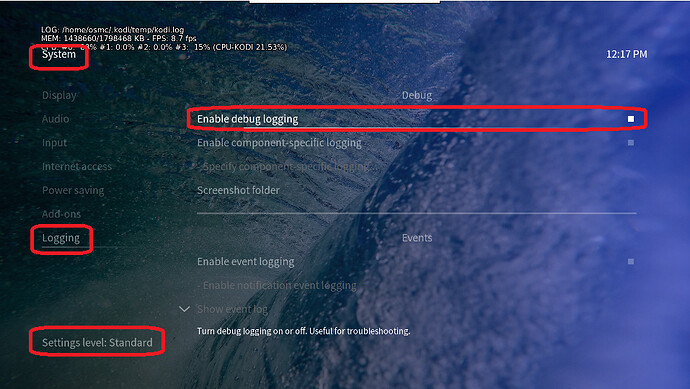We recommend people with 4K TV’s set their user interface (UI) to 1080p. Kodi’s UI is not optimized for 4K yet and this can put unnecessary demands on your device and can lead to a suboptimal picture quality, as well as potentially cause other issues.
With the above settings your UI will be output in Full HD and your 4K content will be output in 4K. *Information regarding the whitelist can be found here. If you have any doubt, feel free to upload some logs so we can verify that your settings are indeed correct.
You installed a bunch of packages last September that are not useful for the normal Kodi operation of OSMC.
Start-Date: 2019-09-04 18:56:59
Requested-By: osmc (1000)
Install: libjson-glib-1.0-0:armhf (1.2.6-1, automatic), libxdmcp6:armhf (1:1.1.2-3, automatic), libsoup-gnome2.4-1:armhf (2.56.0-2+deb9u2, automatic), libcroco3:armhf (0.6.11-3, automatic), libpangoft2-1.0-0:armhf (1.40.5-1, automatic), glib-networking-services:armhf (2.50.0-1+b1, automatic), libxcb-xfixes0:armhf (1.12-1, automatic), armv7-transmission-app-osmc:armhf (2.9.4-1), libgdk-pixbuf2.0-0:armhf (2.36.5-2+deb9u2, automatic), libproxy1v5:armhf (0.4.14-2, automatic), dconf-service:armhf (0.26.0-2+b1, automatic), libcairo-gobject2:armhf (1.14.8-1, automatic), glib-networking:armhf (2.50.0-1+b1, automatic), libgtk-3-common:armhf (3.22.11-1, automatic), libxcb-present0:armhf (1.12-1, automatic), libgtk-3-0:armhf (3.22.11-1, automatic), libpixman-1-0:armhf (0.34.0-1, automatic), libdbusmenu-glib4:armhf (12.10.2-2, automatic), librsvg2-common:armhf (2.40.16-1+b1, automatic), libxrender1:armhf (1:0.9.10-1, automatic), dconf-gsettings-backend:armhf (0.26.0-2+b1, automatic), libnatpmp1:armhf (20110808-4+b1, automatic), libxcursor1:armhf (1:1.1.14-1+deb9u2, automatic), libthai-data:armhf (0.1.26-1, automatic), libindicator3-7:armhf (0.5.0-3+b1, automatic), libegl1-mesa:armhf (13.0.6-1+b2, automatic), libxcb-shm0:armhf (1.12-1, automatic), libepoxy0:armhf (1.3.1-2, automatic), libappindicator3-1:armhf (0.4.92-4, automatic), gsettings-desktop-schemas:armhf (3.22.0-1, automatic), libxcb-render0:armhf (1.12-1, automatic), libminiupnpc10:armhf (1.9.20140610-4, automatic), libx11-6:armhf (2:1.6.4-3+deb9u1, automatic), glib-networking-common:armhf (2.50.0-1, automatic), libsoup2.4-1:armhf (2.56.0-2+deb9u2, automatic), libgbm1:armhf (13.0.6-1+b2, automatic), libxshmfence1:armhf (1.2-1+b2, automatic), libwayland-client0:armhf (1.12.0-1+deb9u1, automatic), fontconfig:armhf (2.11.0-6.7+b1, automatic), libxau6:armhf (1:1.0.8-1, automatic), libatk1.0-0:armhf (2.22.0-1, automatic), libxcomposite1:armhf (1:0.4.4-2, automatic), adwaita-icon-theme:armhf (3.22.0-1+deb9u1, automatic), libpangocairo-1.0-0:armhf (1.40.5-1, automatic), libxcb1:armhf (1.12-1, automatic), libatspi2.0-0:armhf (2.22.0-6+deb9u1, automatic), librsvg2-2:armhf (2.40.16-1+b1, automatic), libxi6:armhf (2:1.7.9-1, automatic), libxinerama1:armhf (2:1.1.3-1+b3, automatic), libwayland-egl1-mesa:armhf (13.0.6-1+b2, automatic), libjson-glib-1.0-common:armhf (1.2.6-1, automatic), libxrandr2:armhf (2:1.5.1-1, automatic), libdrm2:armhf (2.4.74-1, automatic), libcolord2:armhf (1.3.3-2, automatic), shared-mime-info:armhf (1.8-1+deb9u1, automatic), hicolor-icon-theme:armhf (0.15-1, automatic), libxfixes3:armhf (1:5.0.3-1, automatic), libthai0:armhf (0.1.26-1, automatic), libx11-data:armhf (2:1.6.4-3+deb9u1, automatic), libgdk-pixbuf2.0-common:armhf (2.36.5-2+deb9u2, automatic), libdbusmenu-gtk3-4:armhf (12.10.2-2, automatic), libxdamage1:armhf (1:1.1.4-2+b3, automatic), librest-0.7-0:armhf (0.8.0-2, automatic), libatk-bridge2.0-0:armhf (2.22.0-2, automatic), gtk-update-icon-cache:armhf (3.22.11-1, automatic), libatk1.0-data:armhf (2.22.0-1, automatic), libcairo2:armhf (1.14.8-1, automatic), libpango-1.0-0:armhf (1.40.5-1, automatic), libxcb-dri2-0:armhf (1.12-1, automatic), libxcb-dri3-0:armhf (1.12-1, automatic), libdconf1:armhf (0.26.0-2+b1, automatic), libwayland-server0:armhf (1.12.0-1+deb9u1, automatic), libx11-xcb1:armhf (2:1.6.4-3+deb9u1, automatic), libxcb-sync1:armhf (1.12-1, automatic), libxext6:armhf (2:1.3.3-1+b2, automatic), libdatrie1:armhf (0.2.10-4+b1, automatic), libwayland-cursor0:armhf (1.12.0-1+deb9u1, automatic)
End-Date: 2019-09-04 18:57:44
Ok just to avoid misundertstandig, it means Vero didn’t go into standby but somehow your TV doesn’t get the HDMI signal. I suggest first you change to 1080p and maybe delete the packages you installed if your don’t need an X Environment.
